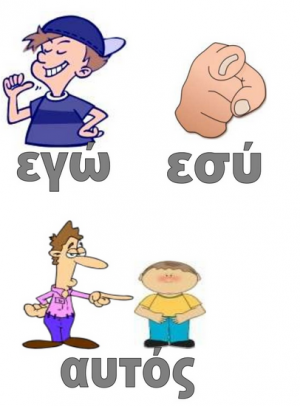Language/Modern-greek-1453/Grammar/Personal-pronouns
Personal pronouns are declinable words and may be used instead of nouns or persons.
The use of personal pronouns with verbs is not obligatory as persons are indicated by the unique personal endings of the verbs.
Personal pronouns may be used to add emphasis. The emphatic form may be used before or after the verb,
while the weak form is always used before the verb.
Attention:
τις is used before and “ τες” after the verb.
Eg : Αν τις δεις, φώναξέ τες: you see them, call them.
Εμένα με λένε Μαριάνθη : They call me Marianthi
Θέλω να δω τον Πέτρο : I want to speak to Peter.
Θέλω να τον δω : I want to speak to him.
As you complete this lesson, consider broadening your horizons with these related topics: Verb To Be, The predicate, The degrees of the adjective & Punctuation.
Overview personal pronoun[edit | edit source]
The following table shows the declension of the personal pronouns.
The forms placed within brackets are the weak forms, the other are the emphatic ones
Strong and weak forms of personal pronouns[edit | edit source]
| Singular | ||||
| Ονομαστική : Nominatif | Γενική : Genitif | Αιτιατική : Accusatif | ||
| 1e person | Εγώ : I / je | Εμένα (μου) :me | Εμένα (με) : me / je | |
|
2e person |
Εσύ : you / tu | Εσένα (σου) : you / tu | Εσένα (σε) : you / il-elle | |
|
3e person |
Αυτός (τος), -ή (τη), -ό (το)
E : he, she, it F : il, celui-ci |
Αυτού (του), αυτής (της) , αυτόν (τον) :
She / Elle, celui-là |
αυτήν –(την) : her / celle-ci | |
| Strong and weak forms of personal pronouns : Plural | ||||
| Nominatif | Genitif | Accusatif | ||
| 1e person | Εμείς : we / nous | Εμάς (μας) : us / nous | Εσάς (σας) : you / vous | |
| 2e person | Εσείς : you / vous | Εσάς (σας) : you / vous | ||
| 3e person | αυτοί, -ές, -ά : they / ils-elles | Αυτών (των), αυτούς (τους), αυτές (τις, τες) : them / leur | ||
Προσωπικές Αντωνυμίες[edit | edit source]
Προσωπικές αντωνυμίες είναι οι μικρές εκείνες λέξεις που τις χρησιμοποιούμε στη θέση ονομάτων ή ουσιαστικών, προκειμένου να αποφεύγονται οι επαναλήψεις. Φανερώνουν τα τρία πρόσωπα του λόγου, έχουν ενικό και πληθυντικό αριθμό. Οι προσωπικές αντωνυμίες σχηματίζουν δύο τύπους: τους δυνατούς και τους αδύνατους.
Οι δυνατοί τύποι
Έχουν δύο ή τρεις συλλαβές και συνηθίζονται όταν βρίσκονται μόνοι στο λόγο ή όταν θέλουμε να τονίσουμε κάτι ή να το ξεχωρίσουμε από κάτι άλλο.
π.χ.
-Ποιον θέλεις;
-Εσένα.
-Να φύγει αυτός, όχι εγώ.
Οι αδύνατοι τύποι
Είναι μονοσύλλαβοι, δεν τονίζονται και χρησιμοποιούνται όταν δε θέλουμε να τονίσουμε κάτι ή να το ξεχωρίσουμε από κάτι άλλο. π.χ.
Με πήρε… Του είπα. Σου τηλεφώνησε ;
« Τις » μπαίνει πριν από το ρήμα ενώ ο αδύνατος τύπος « τες » μπαίνει μετά το ρήμα
Μετά τα άρθρα, υπάρχει ουσιαστικό. Π.χ.: Πήγε ταξίδι με τους φίλους το�
Μετά τις αντωνυμίες (ή πριν από αυτές ) υπάρχει ρήμα. Πχ: Τον παρακάλεσε να φέρει νερό
Author[edit source]
- Ευγενική χορηγία που στοχεύει να βοηθήσει μαθητές ή μη, απανταχού της Γης, που επιδίδονται στην εκμάθηση της ελληνικής γλώσσας!
- Contribution bénévole visant à aider les personnes, partout dans le monde, qui sont engagées dans l'apprentissage de la langue grecque !
- Voluntary contribution aimed at helping people, all over the world, who are committed to learning the Greek language!
Other Lessons[edit | edit source]
- Pronouns
- Negations
- Pronoms interrogatifs
- Active and passive verbs
- Basic spelling rules
- Greek phonology of the consonants : Φφ Θθ
- The comma
- Reflective pronouns Αυτοπαθείς αντωνυμίες
- Adjectives
- Nouns

